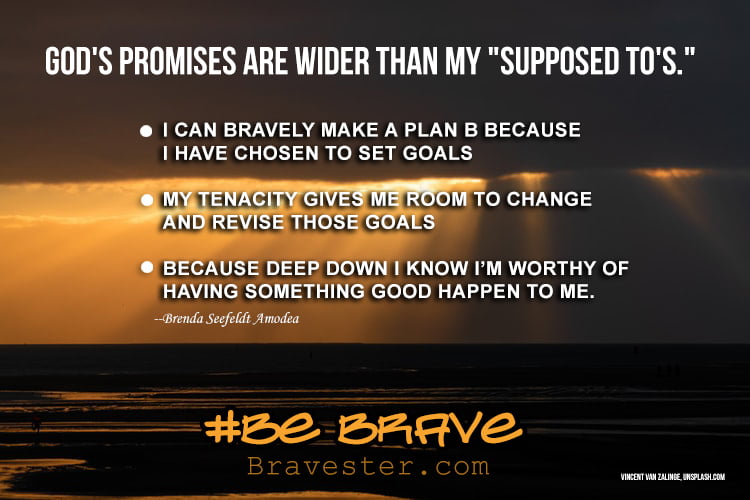You need to be vulnerably seen. When it feels safer to be a rock.

I don’t like this discomfort either. I didn’t think my life would end up this way. I didn’t think I would feel so many emotions. I shouldn’t be feeling this emotion. It’s not supposed to be this way.
These are my thoughts now at times. Definitely my thoughts when I was single. When I was single I shook my fists a lot at God with my “supposed to’s.” God and I made a “deal.” I went into full-time ministry and he was supposed to provide a partner for me.
Very very very thankfully I was wise enough to not accept any partner. I waited and waited and waited for the right match. As I lived in my discomfort.
But I didn’t become a rock. A rock never hopes, connects, or is brave.
I have chosen brave faith. This is my brave decision to brave decision to brave decision. This is trusting God with time over my “supposed-to’s.” This also means I chose the brave decision to be vulnerably seen. This also means I was hurt.
Meanwhile do not be afraid to lean into the discomfort. That sounds like such a horrible sentence, but…
“In fact, most of us were never taught how to hold discomfort, sit with it, or communicate with it, only how to discharge or dump it, or to pretend that it’s not happening. If you combine that with the instinctual avoidance of pain, it’s easy to understand why off-loading becomes a habit. Both nature and nurture lead us to off-load emotion and discomfort, often onto other people. The irony is that at the exact same time that we are creating distance between ourselves and the people around us by off-loading onto others, we are craving deeper emotional connection and richer emotional lives.”
Brene’ Brown, Rising Strong, p. 51
How are you off-loading? Particularly when you are lonely?
Meaningless hook ups? Drinking wine by yourself? Watching more porn by yourself? Contorting yourself so you are desperately hanging on to someone? “Crazy busy” so no one sees you but also so everyone thinks you are important? What are you doing that I didn’t mention?
“The irony is that at the exact same time that we are creating distance between ourselves and the people around us by off-loading onto others, we are craving deeper emotional connection and richer emotional lives.”
You need to be vulnerably seen. When it feels safer to be a rock.
A rock feels like protection—and you have too many emotions right now. Being vulnerably seen feels too squishy.
But your armored-up, rock-of-a-self is too harsh. May I push you to lean into a squishier you?
Not a doormat. Not unboundaried. Not using your discernment (part-brain, part-instinct, part-Holy-Spirit ). Not lying to yourself. Leaning on your team. Staying in this holy tension. Not jumping to a conclusion to protect your heart before something becomes reality.
Here’s a checklist for your squishy self. In Aundi Kolber’s book, Try Softer (recommended), she lists for us what safety feels like.
Look for these things:
- Safety in our bodies feels solid, responsive, and aware.
- Safety in our relationships feels like connection, vulnerability, and trust.
- Safety with God feels like connection, belonging, and mystery.
None of that says be a rock. There is a lot of squishiness in connection, vulnerability and trust, belonging and mystery. But isn’t your soul warmed at the thought of safety?
This is true for you too. I have learned (thank you, time) that I am hard-wired to overcome.
My challenge to you has been laid before you. Are you sufficiently provoked so that your smashed heart can become a passageway for receiving and returning love? Along the way of this brave ride of love, you will connect with other brave riders of love and meet your match. What an adventure—full of safety—that will be.

Do you need a little bit more convincing? Here are some notes from Dr. Brene’ Brown about what your armored-up, rock-of-a-self looks like:
When we’re in fear, or an emotion is driving self-protection, there’s a fairly predictable pattern of how we assemble our armor, piece by piece:
- I’m not enough
- If I’m honest with them about what’s happening, they’ll think less of me or maybe even use it against me.
- No way am I going to be honest about this. No one else does it. Why do I have to put myself out there?
- Yeah. Screw them. I don’t see them being honest about what scares them. And they’ve got plenty of issues.
- It’s actually their issues and shortcomings that make me act this way. This is their fault, and they’re trying to blame me.
- In fact, now that I think about it, I’m actually better than them.
People think it’s a long walk from ‘I’m not enough’ to ‘I’m better than them,’ but it’s actually just standing still. In the exact same place. In fear. Assembling the armor. – Dare to Lead: Brave Work, Tough Conversations, Whole Hearts, pp. 51-52
Yikes.
Read also: Be Brave and Get Curious About What is Happening in Your Soul







Comments
Trackbacks & Pingbacks
[…] You need to be vulnerably seen. When it feels safer to be a rock. […]